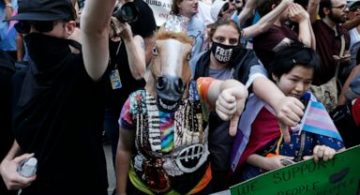
New Jersey Gov. Phil Murphy on Monday ordered the closure of state lands to black bear hunting this year.
The first-year Democratic governor announced the decision with an executive order, but stopped short of unilaterally ending the hunt altogether saying he doesn’t have the authority.
“I am fulfilling my commitment to stop the bear hunt to the greatest extent of my authority by ordering the Department of Environmental Protection to prevent bear hunting on all public lands under the DEP’s jurisdiction,” Murphy said in a statement. He also called on lawmakers to take action.
Murphy campaigned last year on stopping the black bear hunt, but says the state council with the sole responsibility for setting hunting regulations has authorized bear hunting through 2021.
It’s unclear how many bears are taken on state-owned lands.
The DEP says it doesn’t have the information.
New Jersey Sierra Club Director Jeff Tittel supports Murphy’s move and estimates roughly 40 percent of the bears have come from state lands.
Cody McLaughlin, a trustee with the nonprofit New Jersey Outdoor Alliance, which opposes efforts to stop the hunt, estimated that about three-fifths of hunters use public lands when hunting various quarry.
State officials have estimated around 3,500 bears live in northern New Jersey, and McLaughlin estimated that New Jersey has the densest bear populations on the continent.
He said Murphy’s decision ignored scientific studies that show hunting is an effective means of population control, particularly in densely populated New Jersey.
“Honestly, I’m a little shocked and distressed,” McLaughlin said.
Tittel praised Murphy’s decision and called it a “good first start.”
“Unfortunately, there’s plenty of private lands for these bears to still be killed on including county parklands, water company lands, non-profit lands and municipal lands,” he said in a statement.
New Jersey resumed regulated bear hunting in 2003 after a roughly 30-year ban. Another hunt was held in 2005. In 2010, under Republican Chris Christie, the state made it annual, with 409 bears taken last year.
State officials have said the annual hunt is a key part of controlling the bear population, and it cuts back confrontations with humans.
But officials also say there are concerns some bears go hungry because of high population density.
Critics say the hunts are inhumane.
Most of the bears in last year’s hunt were killed in the rural northwestern part of the state, with the highest totals in Sussex and Warren counties.





